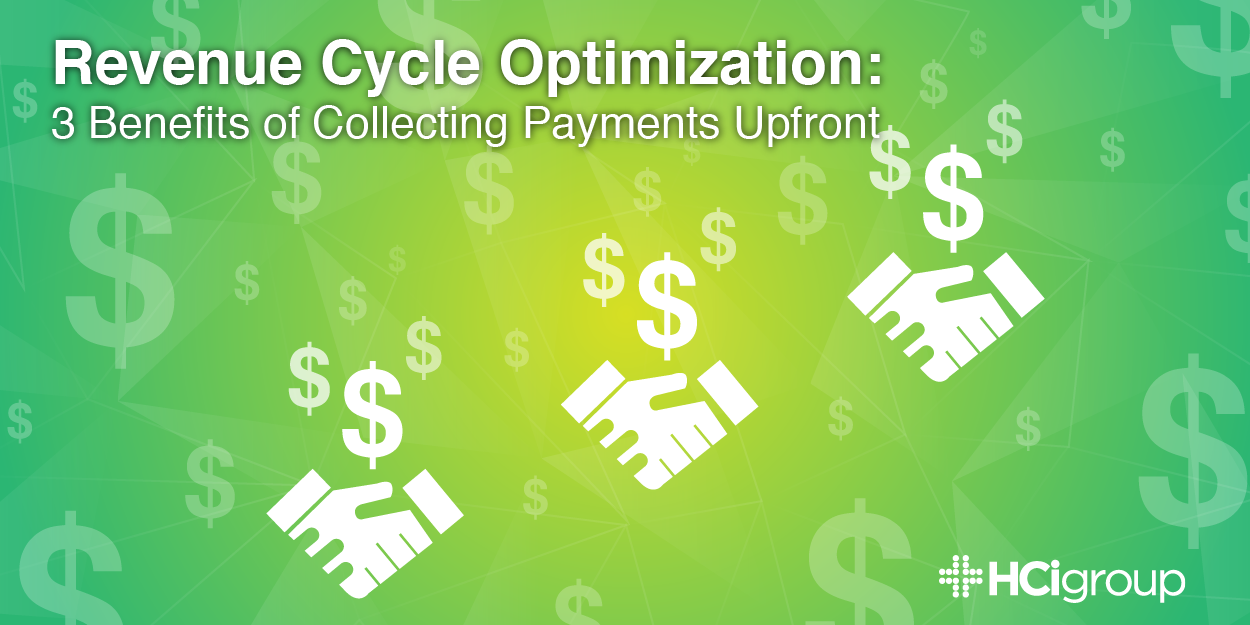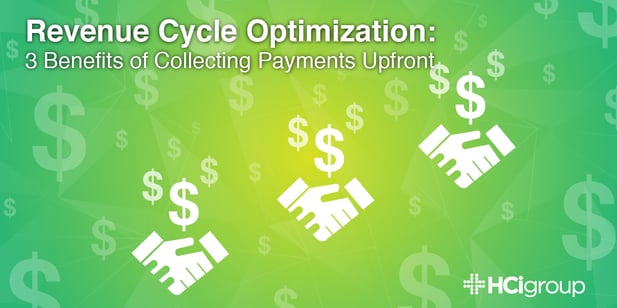Revenue Cycle Optimization: 3 Benefits of Collecting Payments Upfront


Medical debt is exploding as patients assume more responsibility for healthcare costs. Already accountable for 10 percent of US health expenditures, out-of-pocket spending is expected to reach $542 billion by 2025. But, payments lag billings. Since 2000, U.S. hospitals have provided more than $502 billion in uncompensated care expenses. It’s not just for uninsured patients either. The rate of bad debt for insured patients is increasing by more than 30 percent each year at some hospitals.
The costly back-office billing model that hospitals commonly deploy is one of the primary causes of the medical debt conundrum. Patients are confused. Uncertain of their responsibilities, they don’t how much they owe--until they are surprised by post-care bills that they can’t afford.
Except for Medicare and Medicaid beneficiaries, mostly everyone is now covered by a high-deductible plan or they are a self-payer. The old revenue cycle model has been turned on its head. Patients have become the new payers in healthcare.
Do not bill your patients utilizing the same adversarial system that you use to bill contracted insurance providers. Address the traditionally underserved and growing self-pay population on the front end by engaging patients as consumers early in the care delivery process.
Three Benefits of Point-of-Service Collections
1) Collect More
Self-pay patients, on average, pay less than 10% of their total bill. But a study showed an increase an increase of 60% in collections when the price is offered upfront with no additional surprises.
Such surprises can be prevented through point-of-sale collections and patient counseling. Financial counseling helps patients understand what is covered and what is not, thereby eliminating confusion that could cause delays in their payments later.
With patients paying more out-of-pocket, explaining their responsibilities early is crucial for revenue cycle optimization. Collecting their share of care upfront is more efficient because distributing multiple statements with bills from different providers and departments can slow collection by forcing patients to sort out who they are paying and how.
2) Please Patients
Difficulty paying medical bills makes people more likely to negotiate prices or shop for healthcare, according to a medical bills survey by the Kaiser Family Foundation/New York Times. But 69 percent of those with medical bill problems who sought a lower price said it was difficult to learn how much they would have to pay.
Consolidating billing and collecting payments upfront can improve a patient’s experience by clarifying their responsibilities. Patients like knowing that they will not receive a bill after they buy.
Among the insured with problem medical bills, the medical bills survey found that:
- 26 percent received unexpected claim denials;
- 32 percent received care from an out-of-network provider that their insurance wouldn’t cover; and
- 69 percent were unaware that the provider was not in their plan’s network when they received the care.
With the rising trend of consumerism in healthcare, any improvements to the patient experience, such as upfront price transparency and collection could help you attract and retain patients, thus preserving your revenue and accelerating cash flow.
3) Increase Visits
More than 90 percent of patients are satisfied with their primary care physician but many of those patients are postponing or skipping care because of concerns about healthcare costs and medical debt, according to a patient survey commissioned by the Physicians Foundation.
Even for those who have insurance, 62 percent of people having problems with medical bills delayed dental care, 43 percent skipped physician-recommended tests or treatment and 41 percent did not fill a prescription, researchers found.
Such delays make it difficult to maintain patient volume, and thereby revenue. But such decisions could eventually result in higher care costs as well if health issues that could have been prevented or resolved sooner worsen over time because they are not addressed.
Collecting payments upfront also increases the likelihood that a patient will return, thereby generating additional revenue and improving wellness. In addition to increasing POS revenue by 33 percent year-over-year, hospitals that implemented one particular billing system on average generated five times more downstream revenue than the original self-pay purchase. Forty-four percent of patients moved forward with subsequent care versus the industry standard of 30 percent.
With the traditional post-care billing model, collecting slowly can impair your financial operations because your coverage of expenses erodes as accounts receivable age. To give you a sense of how drawn out payments have become, 58 percent of people with problems with medical bills have been contacted by a collection agency in the past year, Becker’s Hospital Review reported.
Upfront payments help you avoid such a prolonged collection cycle, thereby maintaining your ability to cover expenses, while also improving patient experience and increasing visits.
To learn more about HCI's Revenue Cycle Services, contact us today!
Additional Revenue Cycle Resources
- Revenue Cycle Management: Key Steps in Preserving Revenue Integrity During Install
- Revenue Cycle Management (RCM) - Bank on Your Procedures: Charge for Every Procedure Billable and Performed
- Revenue Cycle Management (RCM) - Post EHR Implementation: Much Ado About Charging
- The Inseparable Connection Between Good Testing and Revenue Cycle Implementations
About HCI’s Revenue Cycle & Optimization Services
The HCI Group’s proprietary revenue cycle methodology recognizes that every part of your operation must work seamlessly to improve cash flow, while also assuring full compliance and growth in revenues over the long term. Our experienced resources make sure that every component of the revenue cycle is performing properly, because every single part affects the whole.
In addition, we can help assure that as payment models inevitably change, your organization keeps pace. From ACOs to value-based purchasing, to whatever unknown models lie in the future, we’ll make sure you are ready for the evolution of healthcare economics. Rather than reacting to changes, The HCI Group can make sure you anticipate change and prepare for it completely.

